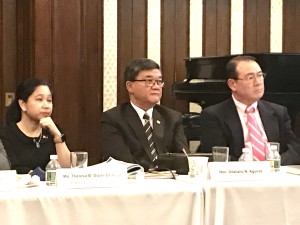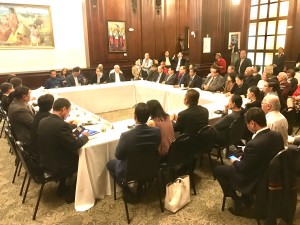How dual citizens may reacquire legal practice in PH

ConGen Tess de Vega (from left); Justice Sec Vitaliano Aguirre; and newly appointed PH envoy to the UN, Amb Teddyboy Locsin INQUIRER/ Elton Lugay
NEW YORK—Legal practice in the Philippines is possible for Filipino Americans who reacquire Filipino citizenship, but candidates might have to go through the Supreme Court (SC) of the Philippines to start the process.
Members of the Philippine Judicial and Bar Council (JBC), led by Justice Sec. Vitaliano Aguirre II, discussed some of the options at a town hall forum held here last week where Jorge Sotto, a dual citizen and a Juris Doctor candidate at the Fordham University School of Law, asked if he would be allowed to take the Philippine bar exam upon acquiring his degree.
“I think we have to welcome this liberalization of law practice and the cross-border practice, but I believe that a treaty is necessary just like treaties where the two countries agree on mutuality,” Aguirre replied.
Lawyer Milagros Fernan-Cayosa, a regular JBC member, explained that an existing SC circular recognizes the eligibility of foreign law school graduates of duly accredited schools.
“Unfortunately the Supreme Court has not come up with guidelines that would accredit [foreign schools]. Why don’t you get the ball rolling? File a petition so that the board can rule on your particular situation and grant you the eligibility to take the Philippine bar,” she told Sotto.
New York-based lawyer Carol Tanjutco, who used to work for the Philippine Court of Appeals, asked whether a special law could bridge the constitutional ban on foreign professionals.
“Would the special law be implemented considering a constitutional prohibition? Because we are all in favor of a cross-border practice. When I left my litigation practice, I came here as [an] anti-money laundering specialist, which is a global practice, so we are very interested,” she said during the forum.

The Philippine Consulate General hosted a Town Hall forum on good governance and judicial reforms led by Justice Sec Vitaliano Aguirre INQUIRER/ Elton Lugay
Dual citizenship is still the answer, according to retired associate justice Angelina Sandoval-Gutierrez, also a member of the JBC.
“Our constitution provides that practice for all professions is limited to Filipino citizens, but then like you—you are a U.S. citizen, now you can apply for dual citizenship. Yes, and then thereafter, you can file a petition with the Supreme Court [so] that you will be re-admitted as a member of the bar and be allowed to practice law. Dual citizenship, I believe is the legal remedy of the bar that will not violate any constitutional provision,” she said.
Fernan-Cayosa mentioned that Minimum Continuing Legal Education (MCLE) compliance is also a requirement in the Philippines and that the current level is 36 units.
The town hall forum was organized by the Philippine Consulate General in New York as a platform for the community to interact with senior officials and policymakers in the Philippine government, according to Consul General Tess Dizon de Vega.
Apart from the liberalization of law practice in the Philippines and cross-border practice, it discussed the Philippine government’s initiatives to improve the judiciary and the justice system, particularly the screening and selection of members of the judicial branch.

